HOW TO PLAN & IMPLEMENT
A ZERO WASTE EVENT
Zero Waste Training Video Transcript
- Graphic of Associated Students SDSU logo.
- Rylie Ridpath: Hello, everyone. As student leaders at SDSU, we have a unique opportunity to lead by example, implementing sustainability on our campus and beyond. We are a part of Green Love, the Associated Students Sustainability Commission and today we’ll share with you a comprehensive guide on planning and implementing zero-waste events, ensuring we minimize our environmental footprint and comply with California waste reduction laws as an SDSU community.
- Shefali Sharma: Zero-waste is a mindset used to minimize environmental harm such as landfill overflow, air and water pollution, climate change and depletion of natural resources.
- Jennifer Tsaur: Zero-waste is not about achieving perfection, it’s about making mindful choices to reduce using unnecessary natural resources and to avoid sending more waste to the landfill. It involves considering both upstream impacts, such as extraction and manufacturing of goods, and downstream impacts such as disposal of these goods.
- Jennifer Tsaur: Our ultimate goal is to avoid creating landfill waste through thoughtful planning and event operations.
- Side-by-side footage of students completing A.S. event operations.
- Rylie Ridpath: In California, sustainability is reinforced by laws such as Senate Bill 1383 and Senate Bill 1335. These laws mandate that all food service packaging in state-owned facilities be reusable, recyclable, or locally compostable.
- Rylie Ridpath: At SDSU, these statewide regulations apply to all food service operations, including events, which means we have a responsibility to adopt a zero-waste mindset in our leadership roles.
- Footage of Primos Mexican Food, Subway, and Panda Express signage on SDSU campus followed by footage of student leaders at an A.S. council meeting.
- Shefali Sharma: Planning a zero-waste event might seem daunting and costly, but we’re here to share that it doesn’t have to be. Here are the steps!
- White title screen with text: “Step One: Simplify Material Use”
- Shefali Sharma: The first way you could do this is the uniform selection of materials. Provide materials to your event attendees that are either reusable or verified compostable. This reduces confusion and the risk of contaminating the compost and recycling streams. Remember to consider all items, even those often overlooked, such as sauce packets, creamer cups and stir sticks.
- White title screen with text: “Vendor Collaboration”
- Jennifer Tsaur: If you’re working with SDSU Catering or external vendors, ensure they plan on using packaging and serviceware that meets compostability standards, which we will describe next.
- Footage of compostable popcorn bag station and native plant station at zero-waste GreenFest event.
- Jennifer Tsaur: If the vendor does not use acceptable packing, supply them with pre-approved, compostable alternatives.
- Jennifer Tsaur: Many vendors offer mostly compostable materials, but a few items usually do not comply.
- White title screen with text: “Step Two: Verify Compostability With Waste Haulers”
- White title screen with text: “Through Understanding Hauler Capabilities”
- Rylie Ridpath: SDSU partners with a waste management company called EDCO for waste hauling services. EDCO’s commercial composting facility efficiently processes food waste and natural fibers, but they cannot break down materials known as bioplastics. This is a type of plastic synthesized by manufacturers out of modified biological materials, unlike food or natural fibers. While bioplastic products are not made out of fossil fuels like normal plastics are, these items are neither compostable nor recyclable at SDSU and should be avoided. This is confusing for consumers like us because the labels on bioplastic products usually say compostable, even though every city’s disposal infrastructure is unique and might not be able to actually compost that item.
- White title screen with text: “Selecting Preferred Materials”
- Shefali Sharma: Opt for fiber- and pulp-based disposables like bamboo, paper, wood, bagasse and parchment. When choosing paper products avoid those coated with paraffin wax as it’s not compostable. Instead, select items with PLA coatings; although PLA is a bioplastic, in thin coatings it decomposes properly at EDCO’s facility.
- White title screen with text: “Responsible Sourcing”
- Jennifer Tsaur: Choose items that are made from renewable raw materials. Look for FSC certified paper and bamboo products indicating that the materials were harvested responsibly.
- White title screen with text: “Step Three: Opt For Bulk Serving Options”
- White title screen with text: “Beverage Service”
- Rylie Ridpath: Serve water and other drinks using dispensers with compostable or reusable cups. For coffee and tea, provide bulk sugar in bowls with spoons and creamers in reusable carafes, eliminating the need for single-use packets.
- White title screen with text: “Food Service”
- Rylie Ridpath: For food service instead of individually packaged snacks. Purchase items like granola, trail mix, or candy in bulk. Serve them in large, reusable containers with appropriate utensils.
- White title screen with text: “Step Four: Equip Venues With Proper Waste Management”
- White title screen with text: “Collaborate With The Custodial Staff”
- Shefali Sharma: Before your event, meet with the custodial team to discuss the waste streams for the items you’ll be using. This ensures that you can help minimize the contamination of compost and recycling containers during cleanups.
- White title screen with text: “Strategic Placement Of Bins”
- Shefali Sharma: If all disposables at your event are compostable, consider placing only green compost bins throughout the venue.
- Footage of event attendees discarding food waste and compostable plates into compost bins.
- Shefali Sharma: Cover or remove recycling and landfill bins to simplify the waste disposal experience for attendees.
- White title screen with text: “Clear Signage”
- Shefali Sharma: Use prominent signs to guide attendees to proper waste disposal. Clear instructions, help prevent contamination and ensure waste is processed correctly.
- Graphic of compostable utensils, napkin, cup, and plates with text: “Compost everything! (including food & liquids)”
- Footage of event attendee disposing of food waste and compostable plate into compost bin.
- Rylie Ridpath: By incorporating these practices into our event planning, we not only meet state regulations, but also cultivate a culture of sustainability at SDSU.
- Footage of Chef Tiago Battastini at the Spring 2025 GreenFest Cooking with Chefs event.
- Rylie Ridpath: It’s crucial that we take action to ensure our planet thrives for future generations.
- Rylie Ridpath: Together, we can make our campus a leader in environmental responsibility.
- Shefali Sharma: For more information and resources, visit the Green Love zero-waste guide Guide on the Associated Students website at as.sdsu.edu/greenlove/zerowaste.
- Jennifer Tsaur: Thank you for your dedication to a sustainable future.
- Jennifer Tsaur: Graphic of Green Love Associated Students SDSU logo.
-
- Have a zero-waste mindset.
- Remember that "zero waste" isn't about perfection. Instead, it is most important to consider the upstream1 and downstream2 impacts of the materials we use, with an ultimate goal of minimizing contributions to the landfill through diversion3.
- In an effort to protect the health of the community, Senate Bill 1383 and Senate Bill 1335 were signed into California state law in 2016 and 2018 respectively. The passage of these bills means that all houses, businesses, and schools must participate in composting procedures and that all food-service packaging distributed in state-owned facilities must be fully reusable, compostable, or recyclable. Both of these laws apply to all events held on the San Diego State University campus, making a zero waste mindset a high priority for our event planning teams!
-
- Make the experience as simple as possible for attendees.
- Providing a variety of compostable, recyclable, and landfill-bound materials is confusing to guests and will result in unintentional contamination4.
- We suggest achieving simplicity by ensuring every material provided to attendees is either reusable or verified compostable (see step 3). This includes easily forgotten disposable items like sauce packets, creamer cups, and stir sticks!
- If you are working with a food service vendor and they do not already serve food and beverages in verified compostable packaging, provide the vendor with alternative packaging that you have pre-approved for verified compostability.
-
- Verify that your waste hauler can truly accept all of your compostable items for composting.
-
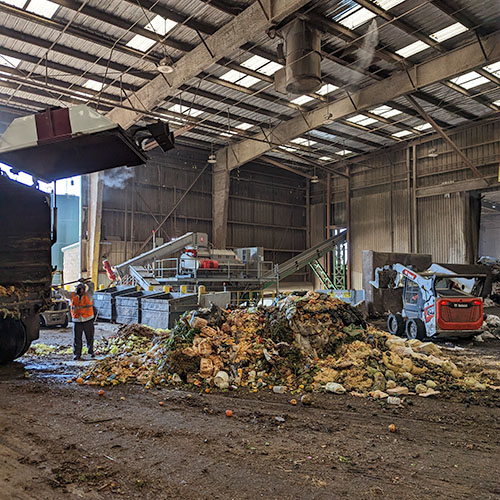
SDSU is serviced by the waste hauler EDCO, who hauls compostable waste to their commercial composter in Escondido. While this facility is amazing at turning food and natural5 fibers into soil, the system cannot break down bioplastics, such as the clear beverage cups or plastic-looking cutlery and straws labeled "compostable." These bioplastic6 products cannot be recycled in the blue bin, either, so it's best to avoid purchasing them entirely.
-
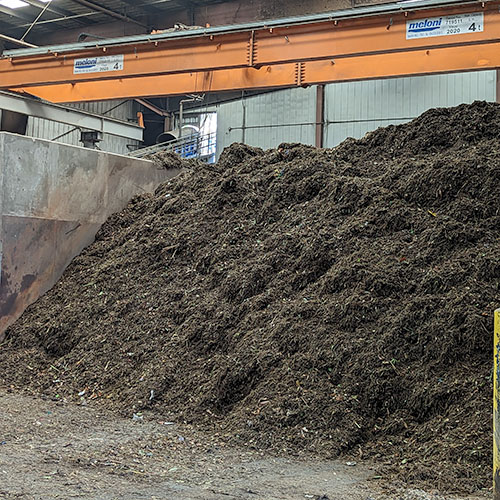
Only fiber and pulp-based disposables are acceptable in our campus compost stream, such as bamboo, paper, wood, bagasse, and parchment. If using paper items, avoid paraffin wax coatings. Paraffin is derived from petroleum and is not compostable. Instead, opt for PLA-coated paper products. Although PLA is a type of bioplastic, when it is only used as a coating it is thin enough to decompose properly at EDCO’s composting facility.
- When considering different options, the best possible option would be one that has sustainable upstream sourcing. Look for items that are FSC-certified, which means the materials (such as wood, paper, or bamboo) were grown and harvested ethically.
-
- Opt for bulk options instead of single-serve packaged goods.
-
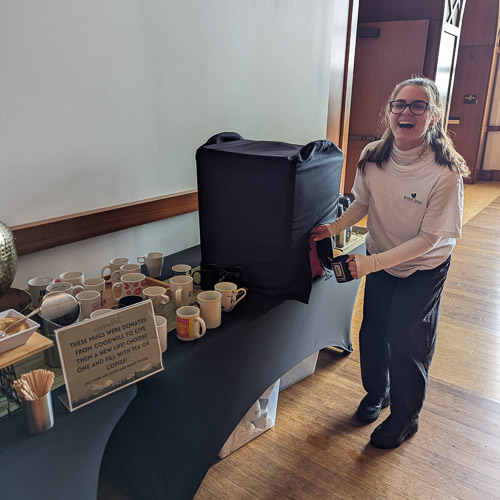
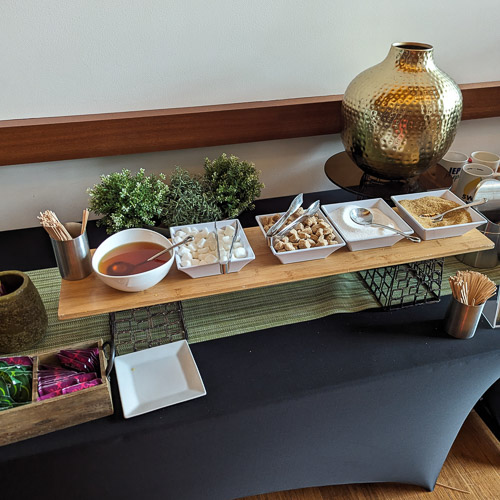
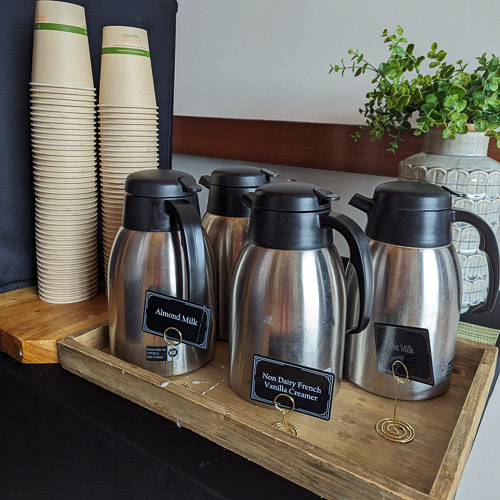
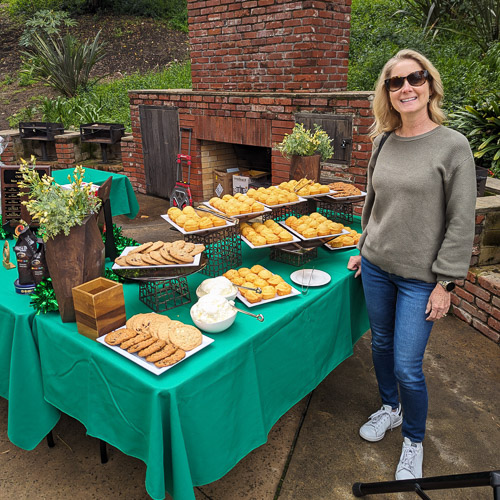
- If water is going to be served, try to serve it via a dispenser and compostable or reusable cups.
- If you're having coffee and tea catered, request bulk sugar in a bowl with a spoon and creamers in reusable carafes instead of plastic packets that cannot be composted or recycled.
- Instead of providing snacks in individually wrapped bags or packets, purchase bulk equivalents like granola, trail mix, candy, etc. from stores like The Mighty Bin or Sprouts. Serve these in a large reusable dispenser or platter with reusable serving utensils.
-
- Ensure your venue is equipped with a composting collection process and signage.
- Meet with the scheduled custodial team prior to the event to show them which waste stream (compost, recycle, or landfill) the disposable items you are providing should go to. This ensures that the custodial team can knowledgeably remove contamination after the event.
- If you've successfully purchased all compostable disposable items for your event, simplify the experience, for attendees by only placing green compost receptacles around the venue, or cover the blue recycling and black landfill containers with large pieces of paper.
- Place a sign on or above the green compost bins that have photos of the food and compostable disposables provided at your event. Include the message: “Everything from this event can be composted!"
- If aluminum bottles or cans must be provided, ensure there is a blue recycling bin next to every green compost bin, and post event-specific signage. Here is an example of signage.
-
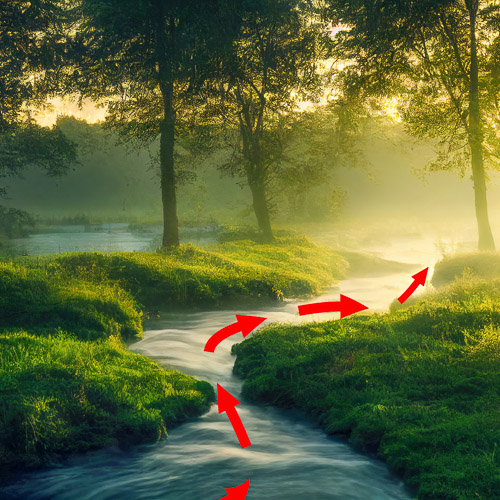
1 Upstream: In sustainability, we use the metaphor of waste "streams" being like a river, where materials flow from one place to another. The mining, cultivation, manufacturing, transportation, and sale of materials before use or consumption are considered "upstream". -
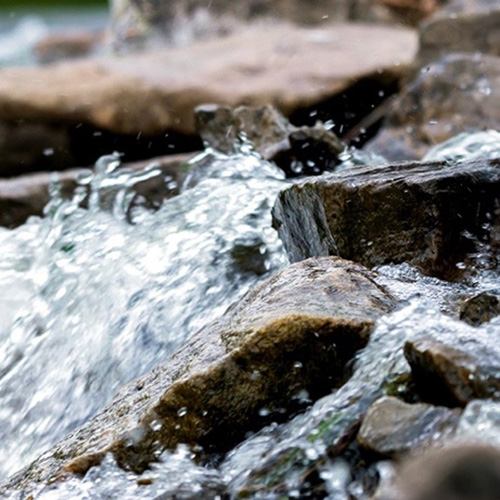
2 Downstream: Similarly to “upstream”, “downstream” refers to the river metaphor of material flow. Impacts of a material after its use or consumption, such as during the processes of reuse, donation, or management of waste products, are considered “downstream.”. -
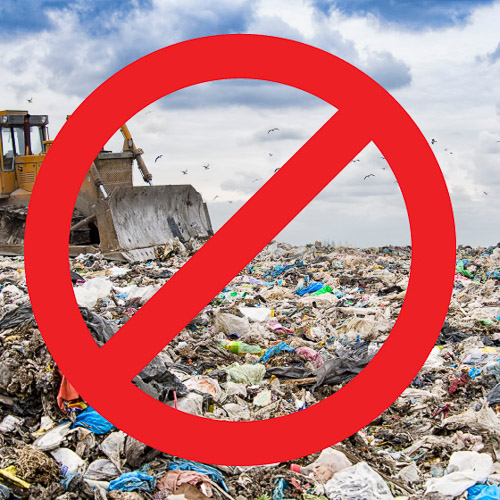
3 Diversion: Alternative waste processing methods to landfills or incineration, such as recycling, composting, reuse, donation, or opting out of purchasing the material completely. -
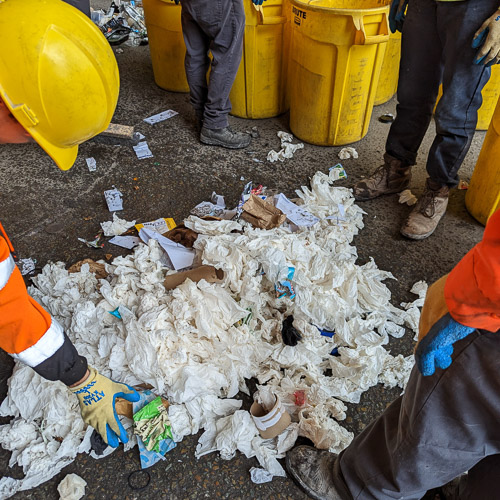
4 Contamination: Anything placed incorrectly in diversion streams, such as plastic or metal in a compost stream, or food waste in a recycling stream. -
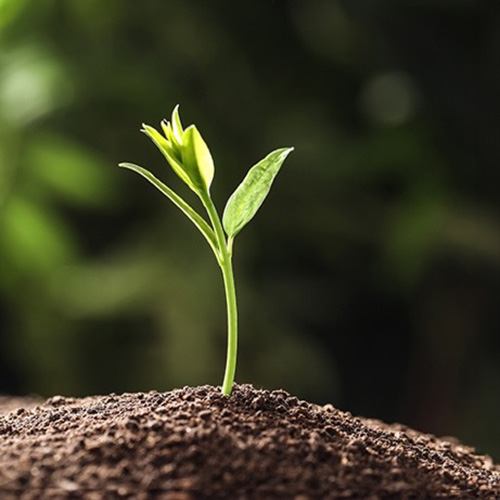
5 Natural: In the context of these zero waste guidelines, natural fibers are grown from the earth and can be physically processed but not chemically synthesized by humans. -
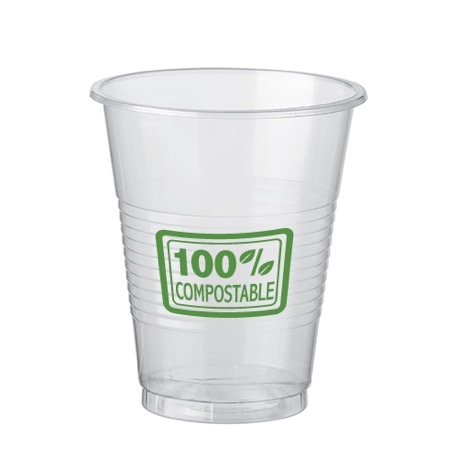
6 Bioplastic: This is a kind of plastic synthesized by manufacturers out of modified biological materials, unlike food or natural fibers.




